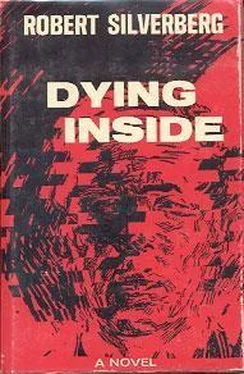Dr. Hittner chuckled. “You’ve got the wrong man,” he said. “I’m Hittner, with an n.” Perhaps he had heard such jokes before. He was a huge man with a long homey face, a wide fleshy mouth, a high curving forehead. Watery blue eyes twinkled behind rimless glasses. His skin was soft and pink and he had a good tangy smell, and he was trying hard to seem friendly and amused and big-brotherly, but David couldn’t help picking up the impression that Dr. Hittner’s brotherliness was just an act. It was something he felt with most adults: they smiled a lot, but inside themselves they were thinking things like, What a scary brat, what a creepy little kid. Even his mother and father sometimes thought things like that. He didn’t understand why adults said one thing with their faces and another with their minds, but he was accustomed to it. It was something he had come to expect and accept.
“Let’s play some games, shall we?” Dr. Hittner said.
Out of the vest pocket of his tweed suit he produced a little plastic globe on a metal chain. He showed it to David; then he pulled on the chain and the globe came apart into eight or nine pieces of different colors. “Watch closely, now, while I put it back together,” said Dr. Hittner. His thick fingers expertly reassembled the globe. Then he pulled it apart again and shoved it across the desk toward David. “Your turn. Can you put it back together too?”
David remembered that the doctor had started by taking the E-shaped white piece and fitting the D-shaped blue piece into one of its grooves. Then had come the yellow piece, but David didn’t recall what to do with it; he sat there a moment, puzzled, until Dr. Hittner obligingly flashed him a mental image of the proper manipulation. David did it and the rest was easy. A couple of times he got stuck, but he was always able to pull the answer out of the doctor’s mind. Why does he think he’s testing me, David wondered, if he keeps giving me so many hints? What’s he proving? When the globe was intact David handed it back. “Would you like to keep it?” Dr. Hittner asked.
“I don’t need it,” David said. But he pocketed it anyway.
They played a few more games. There was one with little cards about the size of playing cards, with drawings of animals and birds and trees and houses on them; David was supposed to arrange them so that they told a story, and then tell the doctor what the story was. He scattered them at random on the desk and made up a story as he went along. “The duck goes into the forest, you see, and he meets a wolf, so he turns into a frog and jumps over the wolf right into the elephant’s mouth, only he escapes out of the elephant’s tushie and falls into a lake, and when he comes out he sees the pretty princess here, who says come home and I’ll give you gingerbread, but he can read her mind and he sees that she’s really a wicked witch, who—” Another game involved slips of paper that had big blue ink-blots on them. “Do any of these shapes remind you of real things?” the doctor asked. “Yes,” David said, “this is an elephant, see, his tail is here and here all crumpled up, and this is his tushie, and this is where he makes pee-pee.” He had already discovered that Dr. Hittner became very interested when he talked about tushies or pee-pee, so he gave the doctor plenty to be interested about, finding such things in every inkblot picture. This seemed a very silly game to David, but apparently it was important to Dr. Hittner, who scribbled notes on everything David was saying. David studied Dr. Hittner’s mind while the psychiatrist wrote things down. Most of the words he picked up were incomprehensible, but he did recognize a few, the grown-up terms for the parts of the body that David’s mother had taught him: penis, vulva, buttocks, rectum, things like that. Obviously Dr. Hittner liked those words a great deal, so David began to use them. “This is a picture of an eagle that’s picking up a little sheep and flying away with it. This is the eagle’s penis, down here, and over here is the sheep’s rectum. And in the next one there’s a man and a woman, and they’re both naked, and the man is trying to put his penis inside the woman’s vulva only it won’t fit, and—” David watched the fountain pen flying over the paper. He grinned at Dr. Hittner and turned to the next ink-blot.
Next they played word games. The doctor spoke a word and asked David to say the first word that came into his head. David found it more amusing to say the first word that came into Dr. Hittner’s head. It took only a fraction of a second to pick it up, and Dr. Hittner didn’t seem to notice what was going on. The game went like this:
“Father.”
“Penis.”
“Mother.”
“Bed.”
“Baby.”
“Dead.”
“Water.”
“Belly.”
“Tunnel.”
“Shovel.”
“Coffin.”
“Mother.”
Were those the right words to say? Who was the winner in this game? Why did Dr. Hittner seem so upset?
Finally they stopped playing games and simply talked. “You’re a very bright little boy,” Dr. Hittner said. “I don’t have to worry about spoiling you by telling you that, because you know it already. What do you want to be when you grow up?”
“Nothing.”
“Nothing?”
“I just want to play and read a lot of books and swim.”
“But how will you earn a living?”
“I’ll get money from people when I need it.”
“If you find out how, I hope you’ll tell me the secret,” the doctor said. “Are you happy here in school?”
“No.”
“Why not?”
“The teachers are too strict. The work is too dumb. The children don’t like me.”
“Do you ever wonder why they don’t like you?”
“Because I’m smarter than they are,” David said. “Because I—” Ooops. Almost said it. Because I can see what they’re thinking. Mustn’t ever tell anyone that. Dr. Hittner was waiting for him to finish the sentence. “Because I make a lot of trouble in class.”
“And why do you do that, David?”
“I don’t know. It gives me something to do, I guess.”
“Maybe if you didn’t make so much trouble, people would like you more. Don’t you want people to like you?”
“I don’t care. I don’t need it.”
“Everybody needs friends, David.”
“I’ve got friends.”
“Mrs. Fleischer says you don’t have very many, and that you hit them a lot and make them unhappy. Why do you hit your friends?”
“Because I don’t like them. Because they’re dumb.”
“Then they aren’t really friends, if that’s how you feel about them.”
Shrugging, David said, “I can get along without them. I have fun just being by myself.”
“Are you happy at home?”
“I guess so.”
“You love your mommy and daddy?”
A pause. A feeling of great tension coming out of the doctor’s mind. This is an important question. Give the right answer, David. Give him the answer he wants.
“Yes,” David said.
“Do you ever wish you had a baby brother or sister?”
No hesitation now. “No.”
“Really, no? You like being all alone?”
David nodded. “The afternoons are the best time. When I’m home from school and there’s nobody around. Am I going to have a baby brother or sister?”
Chuckles from the doctor. “I’m sure I don’t know. That would be up to your mommy and daddy, wouldn’t it?”
“You won’t tell them to get one for me, will you? I mean, you might say to them that it would be good for me to have one, and then they’d go and get one, but I really don’t want—” I’m in trouble, David realized suddenly.
“What makes you think I’d tell your parents it would be good for you to have a baby brother or sister?” the doctor asked quietly, not smiling now at all.
Читать дальше












